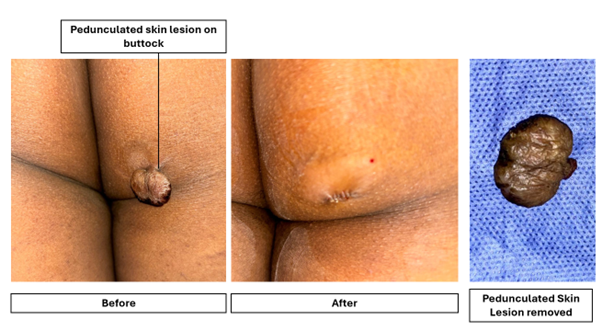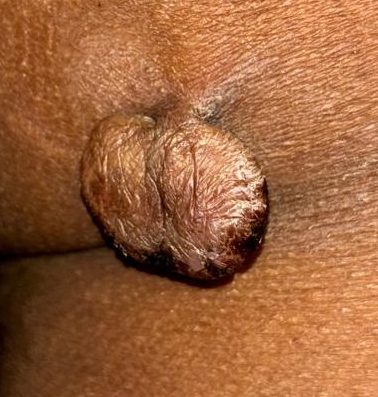What Are Pedunculated Skin Lesions?
Pedunculated skin lesions are soft tissue growths attached to the skin by a thin stalk or stem (pedicle). These lesions are usually benign (non-cancerous) and can include:
- Skin tags (acrochordons)
- Intradermal or compound naevi (moles)
- Seborrhoeic keratoses
- Fibroepithelial polyps or papillomas
While they are harmless in most cases, their location and mobility can make them uncomfortable or troublesome.
Why Can They Be Painful or Problematic?
- Pressure and Compression Injuries
When these lesions develop in areas where the skin is pressed against a hard surface, they can repeatedly get squeezed or crushed.
Common example: The buttocks or gluteal region.
When sitting, a pedunculated lesion can be trapped between the skin and the underlying pelvic bone. This causes:
- Sharp pain and tenderness
- Swelling and redness
- Difficulty sitting or walking comfortably
- Torsion of the Lesion
Because of their thin stalk, these lesions can twist (torsion). This leads to:
- Obstruction of venous and lymphatic drainage
- Rapid swelling
- Darkening or discolouration of the lesion
- Persistent throbbing pain
- Repeated Trauma and Infection
- Friction from clothing or pressure causes micro-injuries
- Increased risk of bleeding, crusting and infection
- Can become debilitating if it happens repeatedly
When Should You Seek Treatment?
Indications for Excision:
✔ Recurrent pain or tenderness
✔ Swelling due to torsion or trauma
✔ Repeated infection or bleeding
✔ Cosmetic concern or irritation from clothing
✔ Difficulty sitting, walking or sleeping
✔ Suspicious changes – rapid growth, colour change, ulceration
Important Considerations :
✖ Active infection at the site – may require antibiotics first
✖ Bleeding disorders or uncontrolled anticoagulant medication
✖ Suspicion of malignancy – requires careful clinical assessment
✖ Poor wound healing tendency (e.g., uncontrolled diabetes)
Treatment – Simple Office-Based Procedure Under Local Anaesthetic
Most benign pedunculated lesions can be removed safely at MACS Clinic under local anaesthesia as an outpatient procedure.
Elliptical Excision and Direct Closure (Simple Explanation for Patients):
- The area is cleaned and numbed with local anaesthetic.
- The lesion and its stalk are removed in an elliptical shape, ensuring complete excision.
- The wound is closed directly using dissolvable stitches – no need for suture removal.
- A light dressing is applied.
If the lesion appears abnormal, it is sent for histopathological examination (biopsy).

Postoperative Care:
- Keep the area clean and dry for 24 hours
- Avoid pressure, stretching or sitting directly on the wound (if over buttocks)
- Showering is allowed after 24 hours – gently pat dry
- Apply any prescribed ointment or dressing as advised
- Dissolvable sutures usually disappear within 10–14 days
- Mild discomfort, bruising or swelling is expected for a few days
- Contact the clinic if you notice: increasing pain, warmth, discharge, redness, fever
Benefits of Early Removal:
✅ Quick relief from pain and pressure
✅ Prevents future swelling, torsion or infection
✅ Improves comfort while sitting, walking or exercising
✅ Leaves minimal scarring when performed early
✅ Performed safely under local anaesthetic with minimal downtime
When Is Histopathology Recommended?
- If the lesion is pigmented or irregular
- Rapid growth or ulceration
- Family/personal history of skin cancer
- Any suspicion of dysplastic or malignant changes
Summary
Pedunculated benign skin lesions are common and usually harmless, but when located over pressure points like the buttocks, they can become painful, swollen, infected or twisted repeatedly. Simple removal under local anaesthetic provides excellent relief and minimal downtime. At MACS Clinic, we ensure safe excision, careful cosmetic closure and send tissue for biopsy when required.
Contact MACS Clinic
- Phone: 020 7078 4378
- WhatsApp: 07792 648 726
- Email: enquiries@macsclinic.co.uk
- Website: www.macsclinic.co.uk
BOOK a FREE Video Consultation: https://calendly.com/macsclinic/free-video-consultation?month=2025-01







